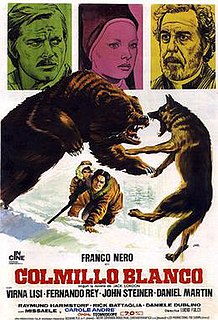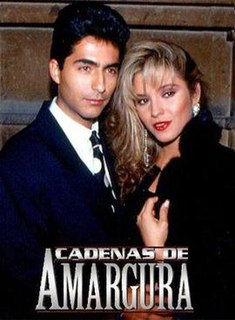Evangelina and Evangeline are feminine given names, diminutives of Latin "evangelium". "Ev" is an accepted abbreviation for these two names.
Evangelina Villegas was a Mexican cereal biochemist whose work with maize led to the development of quality protein maize (QPM). She and her colleague, Surinder Vasal, shared the 2000 World Food Prize for this achievement.

Arm in Arm Down the Street is a 1966 Argentine and Spanish comedy-drama film directed by Enrique Carreras and starring Rodolfo Bebán, Evangelina Salazar and Susana Campos. It won the Silver Condor Award for Best Film, given by the Argentine Film Critics Association in 1967 for the best picture of the previous year.
Evangelina Vigil-Piñón is a Chicana poet, children's book author, director, translator, and television personality.
Amores Cruzados is a telenovela produced by TV Azteca and Caracol TV Internacional. It premiered in 2006. The protagonists are David Zepeda, Michel Gurfi, Ana Lucia Dominguez and Patricia Vasquez. The telenovela was filmed in Mexico and Colombia.

Pasion morena (Morena) is a Mexican telenovela by TV Azteca. It premiered in 2009. The protagonists are Victor González and Paola Núñez. Other actors include Anette Michel, Fernando Ciangherotti, Ari Telch and Evangelina Elizondo. The series also marks the return of Victor Gonzalez and Anette Michel to TV Azteca.

Bailando 2010 was the sixth season of Bailando por un Sueño. It premiered on May 4, 2010. This was the season with the most replacements, due to the withdrawals of two contestants, and injuries to others. Season 6 was also the first in which the judges did not restore some of the losing couples to competition.
Alma Delfina is a Mexican actress.

White Fang is a 1973 Italian adventure film directed by Lucio Fulci. It was produced by Harry Alan Towers and co-written by Roberto Gianviti, based on Jack London's 1906 novel White Fang. It starred Franco Nero, Fernando Rey and Virna Lisi. The film gained a great commercial success and generated an official and several non-official sequels.

The Return of White Fang is a 1974 sequel to White Fang. Both films were directed by Lucio Fulci as part of a trend of films inspired by Call of the Wild (1972), which was a surprise hit in Italy. Two German productions in this trend were Hellhounds of Alaska and Cry of the Black Wolves, both directed by Harald Reinl.

Amanita eliae is an inedible species of fungi in the family of Amanitaceae found in Europe. It was described by Lucien Quélet in 1872. Synonyms include Amanitaria eliae, Amanita godeyi, and Amanita cordae.

Evangelina Cosio y Cisneros was the focus of events that played out in the years 1896–1898 during the Cuban War of Independence. Her imprisonment as a rebel and escape from a Spanish jail in Cuba, with the assistance of the reporter, Karl Decker from William Randolph Hearst's New York Journal, created wide interest in the United States press, as well as accusations of fraud and bribery.
...y no se lo tragó la tierra is Tomás Rivera 1971 novel, most recently translated to English as ...And the Earth Did Not Devour Him. It is made up of fourteen short stories and thirteen vignettes. The novel presents stories that center around a community of South Texan Mexican American migrant farm workers during the late 1940s and early 1950s. The novel begins with the short story "A Lost Year", in which an unnamed male protagonist cannot seem to remember what occurred during the previous year. The stories and vignettes that follow are fragmented, lack chronology and lack consistency in characters. The last short story, "Under the House", ties all of these stories together by presenting them as the memories of the male protagonist, who seems to become empowered by the act of remembering. The novel won the Premio Quinto Sol prize for literature in 1970 and has since been adapted into a movie.

Cadenas de amargura is a Mexican telenovela produced by Carlos Sotomayor for Televisa in 1991. This story whose plot revolves around the bitterness and hatred of a woman Evangelina, who retaliates against her niece, due to heartbreak that had happened during the earlier years of her life. Evangelina had many male suitors but, she got stubborn with the one man that fell in love with her sister Natalia. This on the other hand, produced her sister's daughter Cecilia who was giving away to her Brother Roberto and his wife Elsa. Cecelia was made to believe that she was their legitimate child. And the story goes on forward...
Evangelina Yolanda Salazar is an Argentine actress.
La frontera is a Mexican telenovela produced by Televisa for Telesistema Mexicano in 1967.

Evangelina Elizondo was a Mexican actress and singer from the Golden Age of Mexican cinema. She starred in movies, television and theater. She was an accomplished artist having studied at the National School of Painting and had a degree in theology. She wrote two books and recorded numerous albums. In 2014, she received a Premios Arlequín for her contributions to Mexican culture.
La fuerza del amor is a Mexican telenovela produced by Gonzalo Martínez Ortega for Televisa in 1990.
La culpa is a Mexican telenovela produced by Yuri Breña and Pinkye Morris for Televisa. It premiered on Canal de las Estrellas on August 12, 1996 and ended on October 11, 1996.
Evangelina Guerrero y Entrala de Zacarías (1904-1949) was a poet, short story writer and journalist in the Philippines. She edited the magazine Excelsior. Her stories and poetry were piblished there and in newspapes like La Opinión and La Vanguardia.








